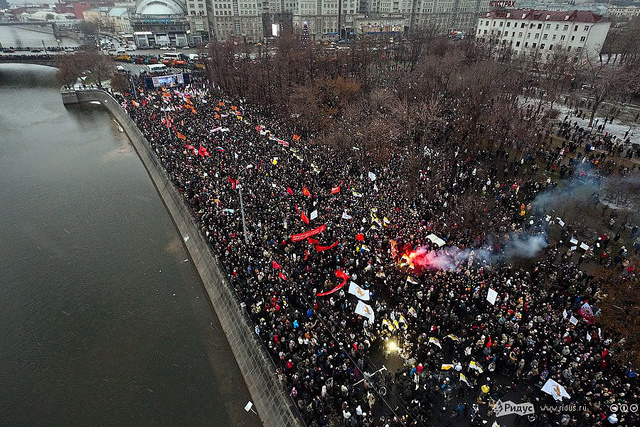
For the last four years, Russia was ruled according to a careful choreography: President Dmitry Medvedev was the face of a variously tough-talking and reformist agenda that included the erection of Skolkovo, a richly financed version of Silicon Valley, and cordiality with the United States. Meanwhile, actual power was wielded by Prime Minister Vladimir Putin, whose will was enacted while he traveled the country exhibiting his physique and off-beat sporting abilities.
The Russian public more or less acceded to this division of political power until September, when Putin disclosed his intention to end the charade, and return to the seat in the Kremlin that he held for eight years before bringing in Medvedev. He and Medvedev would swap positions after the 2012 presidential elections, he revealed. Yet over the last two weeks, we have observed Russians–who since the Soviet breakup have voted like sheep for the officially annointed candidate–proving unreceptive to Putin’s plans. In December 4 parliamentary elections, the pro-Kremlin United Russia party’s two-thirds majority shrunk to about 50 percent. Last weekend, tens of thousands of Muscovites publicly protested the cheating that provided United Russia even that margin of victory. Putin’s crucial aura of unassailability is no more.
How is it that the 59-year-old Putin, a former KGB officer who keenly played the politics of the last decade, so badly stumbled four years later? The simple answer is his violation of a rule known by every magician: do not reveal the mechanics of the trickery. In this case, Russians broadly recognized Putin as their paramount leader, granting him approval ratings exceeding 60 percent. But when he made his autocratic power explicit, he displayed crassly that the choreography was mere show. That made Russians feel trifled with, driving home for them that their new state isn’t dissimilar enough from the Soviet Empire that collapsed 20 years ago, on whose ashes the new Russia is built. The lesser gamble for Putin would have been to maintain the tandem of power, with Medvedev in the Kremlin for another term.
One is stuck with one’s mistakes, however, so while Putin is highly favored to win the March 4 presidential election, bracing Russian politics seem revived. He must now face at least one unexpected opponent, a billionaire steel magnate named Mikhail Prokhorov, who owns the New Jersey Nets.
It is a measure of Kremlinology’s enduring appeal as a discipline that a front-page story in the Financial Times conjectured that Prokhorov’s candidacy was yet more Kremlin theater. According to the account of a swath of skeptical Russians, the paper reported, the 46-year-old Prokhorov was simply doing the Kremlin’s bidding so that Putin could pretend to be practicing democracy. The explanation for this theory is partly in Putin himself–in the days leading to the election, he tarnished anyone who would oppose him as a tool of the West, and when the elections went bad, he blamed Secretary of State Hillary Clinton. As with his own choreography, Putin seemed to be saying, democracy could not happen in the former Soviet space of its own accord, but only if the United States set it in motion.
Yet Prokhorov seems real enough. Now he must collect 2 million signatures to validate his candidacy. As for Putin, he appears so far to have mostly recovered his equilibrium. At first, judges imposed 15-day jail sentences on two critical bloggers, Alexei Navalny and Ilya Yashin, but their local celebrity has since grown, so Putin’s machine is not repeating the mistake. Don’t expect Prokhorov to end up in prison, where Putin sent another billionaire, political rival Mikhail Khodorkovsky, in 2003. Putin has opened up the political space by allowing critics to grouse in the street (another public protest is planned December 24 in Moscow), and his party has suggested that opposition politicians can hold leadership positions in the Duma.
These are all easy steps as long as Putin does not feel mortally threatened. But no one can reasonably expect Putin and his circle of industrialists, bureaucrats, and former and current security officers to voluntarily cede power, regardless of the March election results. Hence protesting and voting will not be enough–if in fact Putin’s opponents have enough votes to oust him.
Some analysts have wondered aloud whether we are witnessing the opening act of a Russian version of the Arab Spring, a second Decembrist movement (the failed “Decembrist” revolt by reformist army officers against Tsar Nicolas I in 1825 is one of the universally celebrated, if doomed, chapters of Russian history). As others have observed, Russia has few of the trappings of the Middle East, apart of course from a politically dissatisfied population, so millions of people in the streets seems implausible. Yet one would be rash to wholly dismiss the influence of the Arab Spring. Would Russia’s middle class be tweeting furiously outside in the cold weather without the examples of Egypt and Syria? Doubtful.
Another possibility short of the mobs-at-the-gates scenario involves a political sacrifice: some conjecture that Putin’s next step will be to throw Medvedev under the bus to appease the mob. In this scenario, Medvedev could step down as early as next week, apologize for fixing the election, and hand over the reins of power early to his mentor for steadier stewardship of the country.
The risk for Putin is that this too will be rejected as so much theater. The question thus is whether he can adapt his game to one in which Russians are demanding the real thing.
Steve LeVine, the author of Putin’s Labyrinth: Spies, Murder, and the Dark Heart of the New Russia, is a Schwartz Fellow at the New America Foundation, a contributing editor at Foreign Policy magazine (which carries his blog The Oil and the Glory), and an adjunct professor at the Georgetown University School of Foreign Service.
*Photo courtesy of mpeake.




Send A Letter To the Editors